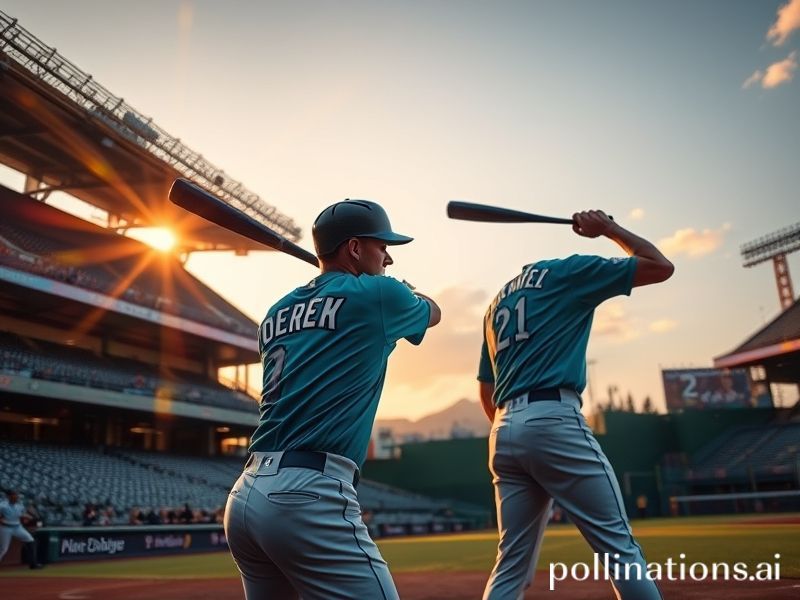Global Schadenfreude: How the Seattle Mariners Became the World’s Favorite Safe Space for Disappointment
The Mariner’s Paradox: How One Rain-Soaked Baseball Club Became the World’s Quietest Metaphor
From the 23rd-floor press box of T-Mobile Park—where the Pacific Northwest drizzle drifts sideways like a reluctant apology—you can almost hear the planet shrugging. Down on the emerald rectangle, the Seattle Mariners are doing what they have done for most of the last four decades: auditioning for relevance while the rest of the globe sorts its larger catastrophes. To the casual observer they are merely a mid-market Major League Baseball team caught in a recursive loop of almosts. Zoom out, however, and the Mariners become something more useful: a low-stakes morality play for an era defined by high-stakes impotence.
Consider the geopolitical backdrop. While supply chains fracture, crypto empires implode, and European land borders are re-drawn by men who still believe in tank columns, the Mariners cling to a 21-year postseason drought—an exquisite mirror for any institution that keeps promising next year will be different. The United Nations issues strongly worded communiqués; the Mariners issue bobbleheads. Both gestures arrive with comparable on-the-ground impact.
The roster itself is a miniature United Nations of dashed dreams. There’s Julio Rodríguez, the Dominican wunderkind whose smile could power a midsize province and whose arbitration years will coincidentally align with the next global recession. There’s Luis Castillo, whose right arm is described by scouts as “borderline electric,” a phrase that sounds suspiciously like the energy policy of any country still subsidizing coal. And there’s Ty France, whose surname alone qualifies him for symbolic duty in a world perpetually at war with itself. Together they form a kind of diaspora of hope, each player carrying the baggage of his homeland’s GDP and his mother’s WhatsApp prayers.
Internationally, the Mariners’ suffering translates surprisingly well. In Seoul, insomniac traders watch MLB.TV between battery drags and think, “At least we’re only down 2.3 percent.” In Lagos, ride-share drivers streaming games over 3G networks use the team’s name as shorthand for any venture that looks promising at first light and soggy by dusk. Even in Geneva—city of accords and artisanal chocolates—diplomats have begun referring to stalled negotiations as “entering extra innings à la Seattle.” The metaphor is both cruel and accurate, which is how you know it works.
Ownership, naturally, remains safely insulated from metaphor. John Stanton, a telecom billionaire whose fortune was minted on the very devices now used to roast him on Twitter, likes to remind fans that payroll flexibility is not unlike climate targets: aspirational, fungible, and somebody else’s problem by 2050. When pressed on results, he gestures toward the ballpark’s LEED-Gold certification, as if saving the planet and saving the franchise were the same spreadsheet cell. It is the sort of pivot one normally associates with Davos after-parties, except the champagne here is Rainier and the canapés are garlic fries.
Yet the Mariners persist, and that persistence radiates outward like low-frequency background radiation. Their Single-A affiliate in Modesto sends weather balloons aloft emblazoned with the team logo, an inadvertent nod to every nation currently floating spy tech over its neighbors. In Japan, high-school pitchers mimic Robbie Ray’s windup in the same way European central bankers mimic whatever the Fed did yesterday—cautiously, reverently, doomed to arrive late. And in that cosmic ledger where human folly is tallied, the franchise’s 3,400-plus regular-season losses since 1977 register as a rounding error, yet still manage to comfort anyone whose own losses feel statistically insignificant.
What, then, is the broader significance of this soggy spectacle? Simply that the Mariners offer the world a rare safe space for communal disappointment. No one dies when they strand the bases loaded. Markets do not crater when their closer blows a save. Unlike elections, supply chains, or Arctic ice shelves, the Mariners’ failures are blessedly contained, almost courteous. They lose so the rest of us don’t have to—an offshore outsourcing of grief.
So when the final out is recorded and another season slides quietly into Puget Sound, remember that somewhere a Ukrainian medic, a Chilean pensioner, and a Bangladeshi coder are all exhaling the same small sigh: “Well, at least we’re not Mariners fans.” In a fractured century, that counts as solidarity. And solidarity, like a pennant, is the one thing no one has figured out how to tank.







